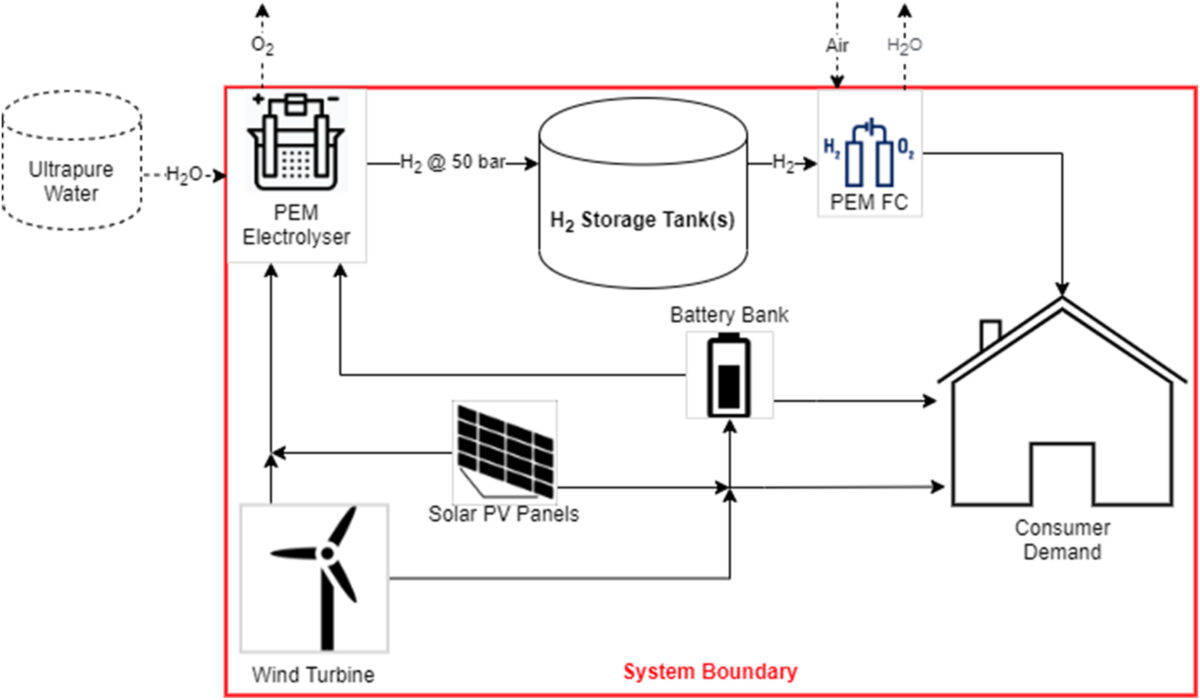Researchers at the Hanze University of Applied Sciences Groningen in the Netherlands have investigated for the first time how to combine hydrogen production and battery storage with rooftop PV power or small wind turbines in off-grid households.
“To the best of our knowledge, no published study used the hydrogen system as the main storage when hybridizing renewable energies with batteries and, most importantly, no studies have considered the variable start-up requirements for proton exchange membrane (PEM) electrolyzers for hydrogen production and storage when designing off-grid renewable energy systems,” the group stated, adding that the batteries are intended to be used to avoid curtailment when hydrogen production cannot be prioritized.
The scientists explained that hydrogen systems based on PEM electrolysis offer the advantage of being fast-response systems, suitable for storage systems where the hydrogen system acts as the main storage unit coupled with a battery as secondary storage. They also stressed, however, that the hydrogen generated via electrolysis needs to be dried and purified from traces of water and oxygen before it can be used.
The proposed system is intended for storing surplus solar power, with the battery acting as a primary storage unit only when hydrogen generation is not immediately available. It consists of a 4.5 kW PEM hydrogen electrolysis system, a 0.85 m3 hydrogen storage tank, a 0.8 kW purification unit, a PEM hydrogen fuel cell, and a lithium-ion battery. “The fuel cell can only supply power directly to the consumer and it does not charge the battery nor support the electrolyzer,” the academics explained. “The electrolyzer and fuel cell require demineralized water and air for operation, respectively.”
The system also relies on a pressure control valve to set the output pressure of the hydrogen, which can be set to almost 50 bar without external means. It is also able to maintain the electrolyzer running when surplus solar power is close enough to the electrolyzer's minimum power and the expected surplus power in the following 10 minutes is relatively high. “It uses the battery to store energy when the power or the duration of the power from renewables is insufficient for the electrolyzer system to start up and operate,” the scientists said.
The research group simulated the performance of the system via Python software and used multiple inputs to decide how to store electrical energy when there is a surplus. They assumed the system to be deployed in a typical detached Dutch house with an annual demand of 4 MWh.
The simulation showed that the best system configuration for the PV source includes a 2.65 kW solar array with a tilt angle of 35 degrees and an azimuth angle of 180 degrees. The cost of the PV system was assumed to be €1,317 ($1,430)/kW, while that of the electrolyzer and the fuel cell was estimated at €9,677 and €7,500, respectively. The cost of the hydrogen tank was indicated at €1,915 and that of the 2.93 kW battery was assumed to be €372.5/kWh.
The analysis demonstrated that, under no circumstances was the electrolyzer able to work at its maximum nominal power, which means it can be downsized, thus reducing the system's costs, the researchers underlined. “Sensitivity analysis on varying the nominal power of the electrolyzer showed that an electrolyzer with a nominal power of between 1,550 W and 2,000 W is more adequate and cost-effective for the configuration of the base case defined in this study,” they further explained, adding that the optimal capacity of the battery was identified at around 3 kW.
The simulation series also showed that solely relying on wind power was more cost-effective than using solar power alone, while a combination of the two sources offered the best results. “The energy required by the purification unit can be considered negligible for all scenarios,” the academics added, noting that future research should test the proposed solution on a larger scale or in a system integrating heat production.
The system was introduced in the study “Simulation and analysis of hybrid hydrogen-battery renewable energy storage for off-electric-grid Dutch household system,” published in the International Journal of Hydrogen Energy.
This content is protected by copyright and may not be reused. If you want to cooperate with us and would like to reuse some of our content, please contact: editors@pv-magazine.com.




Having actually developed a PV hydrogen plant as per this model here in Australia, there are a few insights that I quickly became aware of.
1) heat, about 50% of the energy return from the fuel cell is low grade heat, if you need heat then maybe you can possibly recover some of this, but in Australia, we really dont need heat, so we need to expend energy to get rid of it!
2) efficiency, round trip electrical efficiency of this kind of system is about 20%, your electrolyser is 80% efficient, your fuel cell is 80% efficient, but only 50% is electrical power, and there is a hidden efficiency between fuel cells and electrolysers of 80% because one quotes efficiency at the higher heating value of h2 and the other at the lower, 0.8*0.8*0.5*0.8=26% and you can easilly reduce this below 20% with your ballance of plant requirements. If you can recover 80% of your heat energy, you may be lucky to boost this to 40%.
3) the electrical round trip efficiency of a battery system is 90%
4) a grid connect system selling it on a FIT and buying it back is about 20% efficient (financially) with zero cost outlay.
5) There are better ways of using solar energy to produce hotwater than a fuel cell.
6) whilst the fuel cell returns water that you can use in the electrolyser the process looses (evaporation) about 1l of demineralised water per kg of h2, this is a consumable cost or added plant.
7) in offgrid applications to achieve year round energy assurance the PV requirements are huge, as is the storage needed, that 20% efficiency quickly translates into the size of your PV plant and storage needs (even in Australia)
I was going to say, you can already buy a hydrogen battery like this in Australia; the LAVO Hydrogen battery.
LAVO claims 50% round-trip efficiency, and includes an innovative hydride storage system to solve the other hairy hydrogen problem;storage. I think they achieve that efficiency with clever re-use of the waste heat to drive the hydride storage reactions.
The problem is although 50% efficiency is so good it’s almost hard to believe for hydrogen, it’s terrible in practice ,and nowhere near battery’s 90%. Batteries are also cheaper to buy. So as clever as LAVO’s product is, it only exists because of silly government funding, and is still-born as a viable product.